八年级英语上册一般现在时现在进行时一般过去时和一般将来时时态专练无答案人教新目标版
- 格式:docx
- 大小:53.02 KB
- 文档页数:12
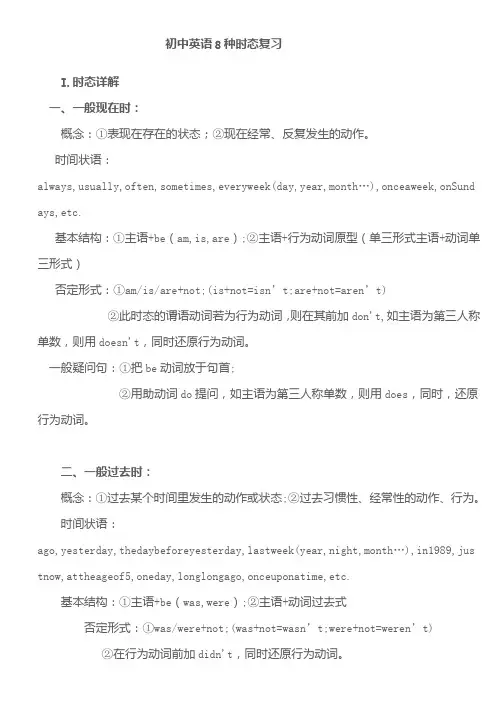
初中英语8种时态复习I.时态详解一、一般现在时:概念:①表现在存在的状态;②现在经常、反复发生的动作。
时间状语:always,usually,often,sometimes,everyweek(day,year,month…),onceaweek,onSund ays,etc.基本结构:①主语+be(am,is,are);②主语+行为动词原型(单三形式主语+动词单三形式)否定形式:①am/is/are+not;(is+not=isn’t;are+not=aren’t)②此时态的谓语动词若为行为动词,则在其前加don't,如主语为第三人称单数,则用doesn't,同时还原行为动词。
一般疑问句:①把be动词放于句首;②用助动词do提问,如主语为第三人称单数,则用does,同时,还原行为动词。
二、一般过去时:概念:①过去某个时间里发生的动作或状态;②过去习惯性、经常性的动作、行为。
时间状语:ago,yesterday,thedaybeforeyesterday,lastweek(year,night,month…),in1989,jus tnow,attheageof5,oneday,longlongago,onceuponatime,etc.基本结构:①主语+be(was,were);②主语+动词过去式否定形式:①was/were+not;(was+not=wasn’t;were+not=weren’t)②在行为动词前加didn't,同时还原行为动词。
一般疑问句:①was或were放于句首;②用助动词did提问,同时还原行为动词。
三、现在进行时:概念:表示现阶段或说话时正在进行的动作及行为。
时间状语:now,look,listen,atthistime,thesedays,etc.基本结构:be(am,is,are)+doing否定形式:be(am,is,are)+not+doing.一般疑问句:把be动词放于句首。
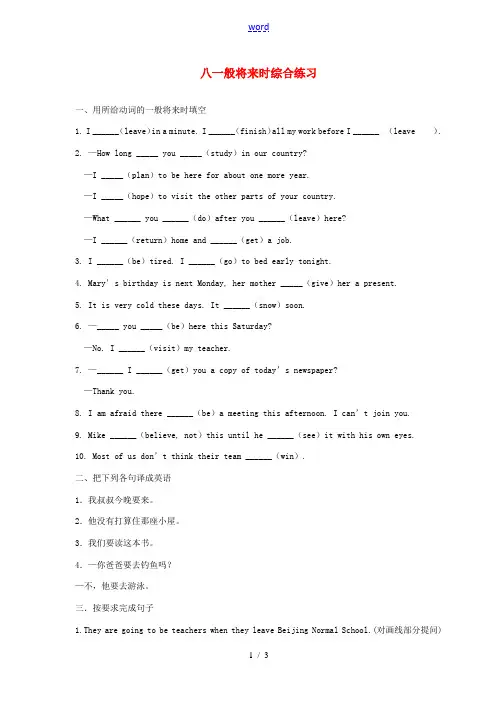
八一般将来时综合练习一、用所给动词的一般将来时填空1. I ______(leave)in a minute. I ______(finish)all my work before I ______ (leave ).2. —How long _____ you _____(study)in our country?—I _____(plan)to be here for about one more year.—I _____(hope)to visit the other parts of your country.—What ______ you ______(do)after you ______(leave)here?—I ______(return)home and ______(get)a job.3. I ______(be)tired. I ______(go)to bed early tonight.4. Mary’s birthday is next Monday, her mother _____(give)her a present.5. It is very cold these days. It ______(snow)soon.6. —_____ you _____(be)here this Saturday?—No. I ______(visit)my teacher.7. —______ I ______(get)you a copy of today’s newspaper?—Thank you.8. I am afraid there ______(be)a meeting this afternoon. I can’t j oin you.9. Mike ______(believe, not)this until he ______(see)it with his own eyes.10. Most of us don’t think their team ______(win).二、把下列各句译成英语1.我叔叔今晚要来。
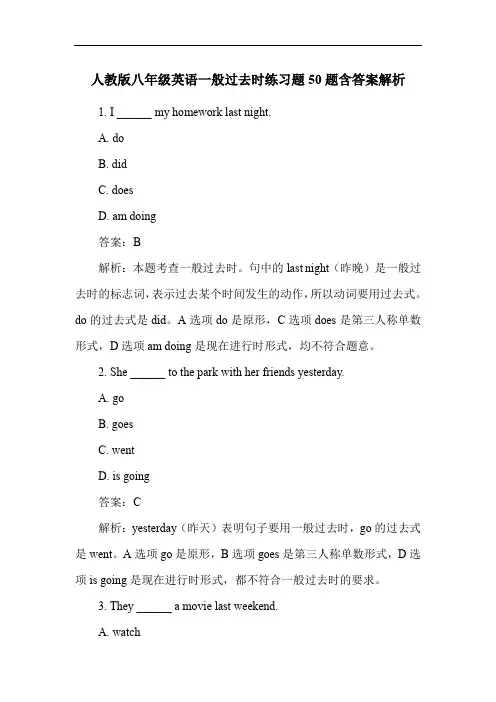
人教版八年级英语一般过去时练习题50题含答案解析1. I ______ my homework last night.A. doB. didC. doesD. am doing答案:B解析:本题考查一般过去时。
句中的last night(昨晚)是一般过去时的标志词,表示过去某个时间发生的动作,所以动词要用过去式。
do的过去式是did。
A选项do是原形,C选项does是第三人称单数形式,D选项am doing是现在进行时形式,均不符合题意。
2. She ______ to the park with her friends yesterday.A. goB. goesC. wentD. is going答案:C解析:yesterday( 昨天)表明句子要用一般过去时,go的过去式是went。
A选项go是原形,B选项goes是第三人称单数形式,D选项is going是现在进行时形式,都不符合一般过去时的要求。
3. They ______ a movie last weekend.A. watchB. watchesC. watchedD. are watching答案:C解析:last weekend(上周末)提示要用一般过去时,watch的过去式是watched。
A选项watch是原形,B选项watches是第三人称单数形式,D选项are watching是现在进行时形式,都不正确。
4. My mother ______ some delicious cakes for me yesterday.A. makeB. makesC. madeD. is making答案:C解析:yesterday表示过去的时间,句子应用一般过去时,make的过去式是made。
A选项make是原形,B选项makes是第三人称单数形式,D选项is making是现在进行时形式,不符合要求。
5. He ______ his bike to school this morning.A. rideB. ridesC. rodeD. is riding答案:C解析:this morning(今天早晨)如果表示过去的时间,句子要用一般过去时,ride的过去式是rode。
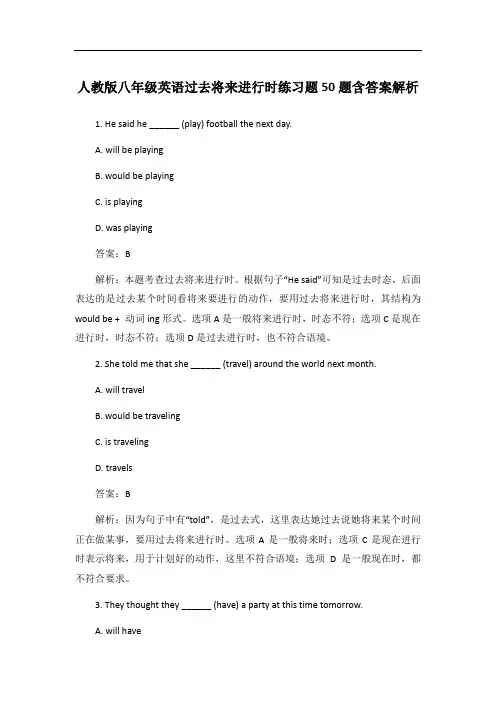
人教版八年级英语过去将来进行时练习题50题含答案解析1. He said he ______ (play) football the next day.A. will be playingB. would be playingC. is playingD. was playing答案:B解析:本题考查过去将来进行时。
根据句子“He said”可知是过去时态,后面表达的是过去某个时间看将来要进行的动作,要用过去将来进行时,其结构为would be + 动词ing形式。
选项A是一般将来进行时,时态不符;选项C是现在进行时,时态不符;选项D是过去进行时,也不符合语境。
2. She told me that she ______ (travel) around the world next month.A. will travelB. would be travelingC. is travelingD. travels答案:B解析:因为句子中有“told”,是过去式,这里表达她过去说她将来某个时间正在做某事,要用过去将来进行时。
选项A是一般将来时;选项C是现在进行时表示将来,用于计划好的动作,这里不符合语境;选项D是一般现在时,都不符合要求。
3. They thought they ______ (have) a party at this time tomorrow.A. will haveB. would be havingC. are havingD. have答案:B解析:“thought”表明是过去时态,这里说他们过去认为明天这个时候正在进行的动作,要用过去将来进行时。
选项A是一般将来时;选项C是现在进行时;选项D是一般现在时,都不符合过去将来进行时的要求。
4. I knew he ______ (study) in the library the following week.A. will studyB. would be studyingC. is studyingD. studied答案:B解析:“knew”为过去式,句子表达我过去知道他将来某个时间正在做某事,要用过去将来进行时。
![新人教版八年级上册英语时态精选练习100题附答案[1]](https://uimg.taocdn.com/840ac0b3f01dc281e43af0b3.webp)
新人教版八年级上册英语时态精选练习100题附答案(word版可编辑修改)新人教版八年级上册英语时态精选练习100题附答案(word版可编辑修改) 编辑整理:尊敬的读者朋友们:这里是精品文档编辑中心,本文档内容是由我和我的同事精心编辑整理后发布的,发布之前我们对文中内容进行仔细校对,但是难免会有疏漏的地方,但是任然希望(新人教版八年级上册英语时态精选练习100题附答案(word版可编辑修改))的内容能够给您的工作和学习带来便利。
同时也真诚的希望收到您的建议和反馈,这将是我们进步的源泉,前进的动力。
本文可编辑可修改,如果觉得对您有帮助请收藏以便随时查阅,最后祝您生活愉快业绩进步,以下为新人教版八年级上册英语时态精选练习100题附答案(word版可编辑修改)的全部内容。
新人教版八年级上册英语时态精选练习100题附答案(word版可编辑修改)新人教版八年级上册英语时态精选练习题附答案1. Li Ping often _____ (read) English in the morning。
2。
_____ he _____ (clean) the windows once a week?3. The workers _____ (have) sports on the playground now。
4. How long ___ you __ (stay) there the day before yesterday?5. Who _____ (listen) to the music?6. When I ____ (be) a middle school student, I often ___(sing).7。
His parents ____(go) to the Great Wall tomorrow morning.8. ____ they _____ (study) Japanese next term?9。
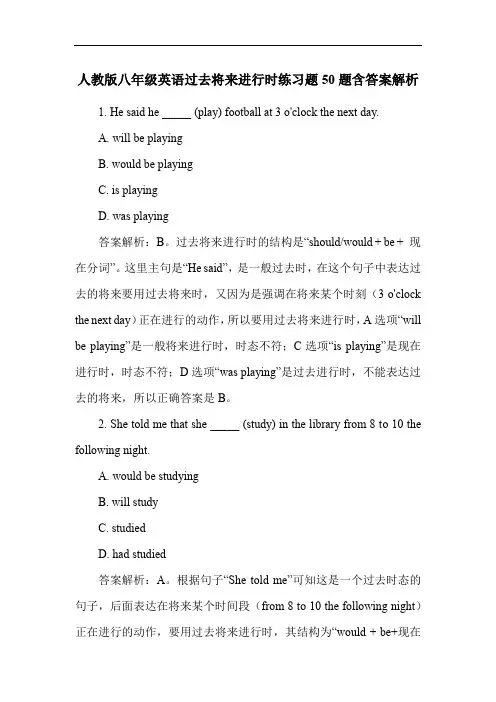
人教版八年级英语过去将来进行时练习题50题含答案解析1. He said he _____ (play) football at 3 o'clock the next day.A. will be playingB. would be playingC. is playingD. was playing答案解析:B。
过去将来进行时的结构是“should/would + be + 现在分词”。
这里主句是“He said”,是一般过去时,在这个句子中表达过去的将来要用过去将来时,又因为是强调在将来某个时刻(3 o'clock the next day)正在进行的动作,所以要用过去将来进行时,A选项“will be playing”是一般将来进行时,时态不符;C选项“is playing”是现在进行时,时态不符;D选项“was playing”是过去进行时,不能表达过去的将来,所以正确答案是B。
2. She told me that she _____ (study) in the library from 8 to 10 the following night.A. would be studyingB. will studyC. studiedD. had studied答案解析:A。
根据句子“She told me”可知这是一个过去时态的句子,后面表达在将来某个时间段(from 8 to 10 the following night)正在进行的动作,要用过去将来进行时,其结构为“would + be+现在分词”。
B选项“will study”是一般将来时,时态不符;C选项“studied”是一般过去时,不能表示将来的动作;D选项“had studied”是过去完成时,也不符合题意,所以A正确。
3. They announced that they _____ (travel) around the world this time next year.A. would be travelingB. are travelingC. were travelingD. will travel答案解析:A。
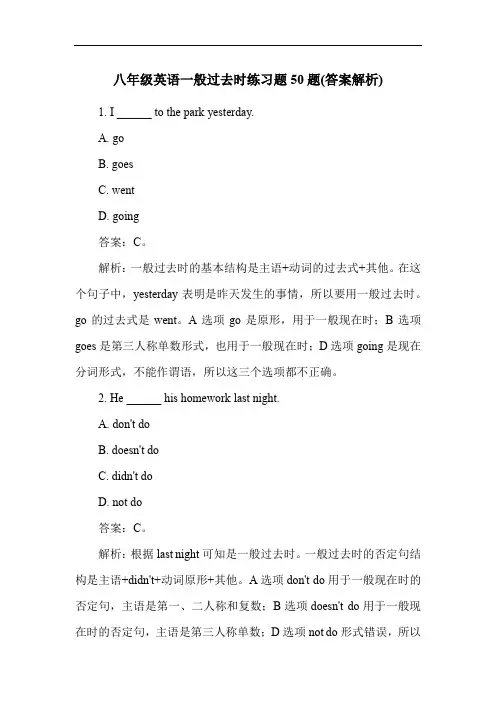
八年级英语一般过去时练习题50题(答案解析)1. I ______ to the park yesterday.A. goB. goesC. wentD. going答案:C。
解析:一般过去时的基本结构是主语+动词的过去式+其他。
在这个句子中,yesterday表明是昨天发生的事情,所以要用一般过去时。
go的过去式是went。
A选项go是原形,用于一般现在时;B选项goes是第三人称单数形式,也用于一般现在时;D选项going是现在分词形式,不能作谓语,所以这三个选项都不正确。
2. He ______ his homework last night.A. don't doB. doesn't doC. didn't doD. not do答案:C。
解析:根据last night可知是一般过去时。
一般过去时的否定句结构是主语+didn't+动词原形+其他。
A选项don't do用于一般现在时的否定句,主语是第一、二人称和复数;B选项doesn't do用于一般现在时的否定句,主语是第三人称单数;D选项not do形式错误,所以正确答案是C。
3. They ______ a great time at the party last week.A. haveB. hadC. hasD. having答案:B。
解析:last week表示上周,句子要用一般过去时。
have的过去式是had。
A选项have是原形,用于一般现在时;C选项has是第三人称单数形式,用于一般现在时;D选项having是现在分词形式,不能作谓语,所以选B。
4. She ______ to school by bike this morning.A. rideB. ridesC. rodeD. riding答案:C。
解析:this morning表示今天早晨,已经发生了,要用一般过去时。
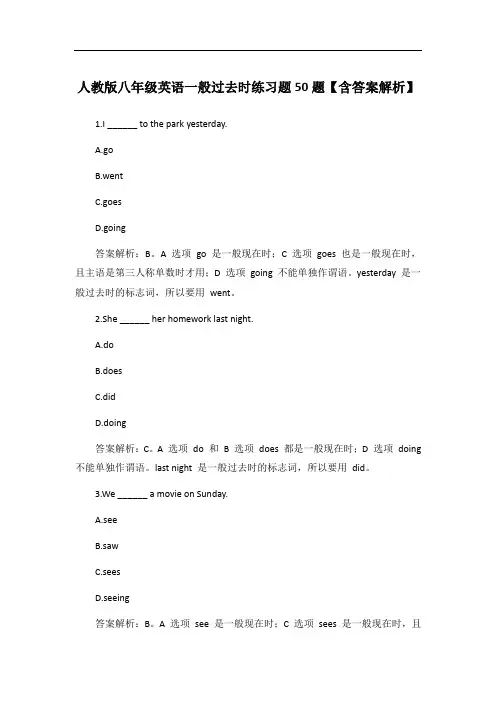
人教版八年级英语一般过去时练习题50题【含答案解析】1.I ______ to the park yesterday.A.goB.wentC.goesD.going答案解析:B。
A 选项go 是一般现在时;C 选项goes 也是一般现在时,且主语是第三人称单数时才用;D 选项going 不能单独作谓语。
yesterday 是一般过去时的标志词,所以要用went。
2.She ______ her homework last night.A.doB.doesC.didD.doing答案解析:C。
A 选项do 和 B 选项does 都是一般现在时;D 选项doing 不能单独作谓语。
last night 是一般过去时的标志词,所以要用did。
3.We ______ a movie on Sunday.A.seeB.sawC.seesD.seeing答案解析:B。
A 选项see 是一般现在时;C 选项sees 是一般现在时,且主语是第三人称单数时才用;D 选项seeing 不能单独作谓语。
on Sunday 在这里可以理解为过去的某个周日,是一般过去时的标志,所以要用saw。
4.They ______ to the beach last weekend.A.goB.wentC.goesD.going答案解析:B。
A 选项go 是一般现在时;C 选项goes 也是一般现在时,且主语是第三人称单数时才用;D 选项going 不能单独作谓语。
last weekend 是一般过去时的标志词,所以要用went。
5.I ______ shopping with my mother yesterday.A.goB.wentC.goesD.going答案解析:B。
A 选项go 是一般现在时;C 选项goes 也是一般现在时,且主语是第三人称单数时才用;D 选项going 不能单独作谓语。
yesterday 是一般过去时的标志词,所以要用went。
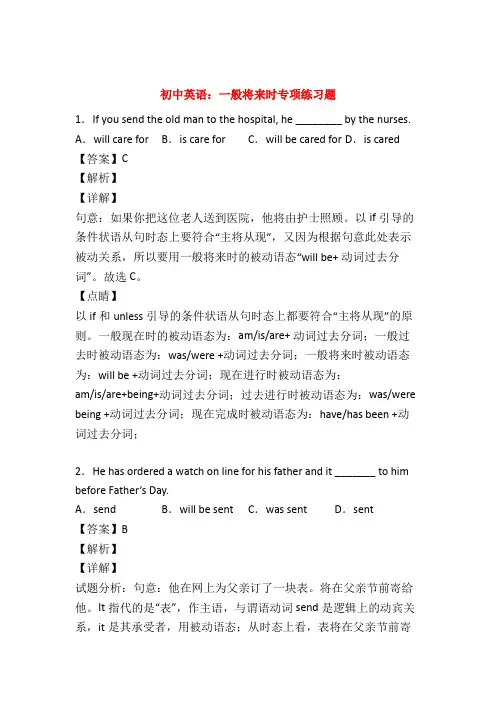
初中英语:一般将来时专项练习题1.If you send the old man to the hospital, he ________ by the nurses. A.will care for B.is care for C.will be cared for D.is cared 【答案】C【解析】【详解】句意:如果你把这位老人送到医院,他将由护士照顾。
以if引导的条件状语从句时态上要符合“主将从现”,又因为根据句意此处表示被动关系,所以要用一般将来时的被动语态“will be+ 动词过去分词”。
故选C。
【点睛】以if和unless引导的条件状语从句时态上都要符合“主将从现”的原则。
一般现在时的被动语态为:am/is/are+ 动词过去分词;一般过去时被动语态为:was/were +动词过去分词;一般将来时被动语态为:will be +动词过去分词;现在进行时被动语态为:am/is/are+being+动词过去分词;过去进行时被动语态为:was/were being +动词过去分词;现在完成时被动语态为:have/has been +动词过去分词;2.He has ordered a watch on line for his father and it _______ to him before Father’s Day.A.send B.will be sent C.was sent D.sent【答案】B【解析】【详解】试题分析:句意:他在网上为父亲订了一块表。
将在父亲节前寄给他。
It指代的是“表”,作主语,与谓语动词send是逻辑上的动宾关系,it是其承受者,用被动语态;从时态上看,表将在父亲节前寄考点:考查动词时态及语态辨析。
3.Different kinds of robots________in the coming robot show in our city.A.display B.are displayed C.will display D.will be displayed【答案】D【解析】【详解】句意:在我们城市即将举办的机器人展上将展出各种各样的机器人。
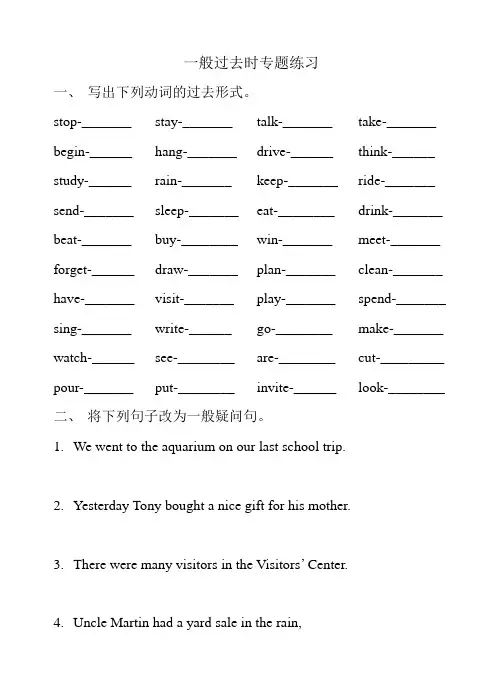
一般过去时专题练习 一、 写出下列动词的过去形式。 stop-_______ stay-_______ talk-_______ take-_______ begin-______ hang-_______ drive-______ think-______ study-______ rain-_______ keep-_______ ride-_______ send-_______ sleep-_______ eat-________ drink-_______ beat-_______ buy-________ win-_______ meet-_______ forget-______ draw-_______ plan-_______ clean-_______ have-_______ visit-_______ play-_______ spend-_______ sing-_______ write-______ go-________ make-_______ watch-______ see-________ are-________ cut-_________ pour-_______ put-________ invite-______ look-________ 二、 将下列句子改为一般疑问句。 1. We went to the aquarium on our last school trip.
2. Yesterday Tony bought a nice gift for his mother. 3. There were many visitors in the Visitors’ Center. 4. Uncle Martin had a yard sale in the rain, 5. He brought an umbrella because it was raining hard outside. 6. Class 9 were very happy on their school trip. 7. Tony helped mom and dad clean the yard on his last day off. 8. Nick visited his cousins last weekend. 9. Laura got Jake Dean’s autograph the day before yesterday. 10. It was really a busy day off. 三、 对划线部分提问。 It was rainy yesterday. We had a great time last Sunday. Lucy helped her classmate study English. They went to Beijing for vacation last summer. I had a hamburger for breakfast this morning. Mom bought four story books for me yesterday.
时态专项 29. Light (travel )much faster than sound. 30 Tom, your aunt
______ (come) this afternoon . 一、 用动词的正确形式填空 31. My teacher often ________ (tell) us not I 1. ____________ (do) my homework every evening. 2. We ___________ (fly) kites in theto play on the street. 32. The teacher said that the park on Sundays. earth ______ (move) round the sun. 33. Look! room on Sundays. 3. My mother _____________ (clean) our Someone ______ the 4. Tom ____________ (play) piano every Saturday. Nowhe __________________ (play). (lie) on the floor.4.It ______ (rain) harder now. It ____ (rain) __________ (like) swimming. She ____________ (swim) last quite often in summer. weekend. 5. She 35. ______ Tom often _______ (play) chess after 6. Usually my mother __________________ (wash) the dishes after lunch. But my grandma school? 36. David __________ (wash) his face and _________ (brush) his (wash) _________________ today. teeth every morning. 37. What time ________ We _____ (leave) tomorrow? ___________________ 7. Look at the man! He (read) a magazine. 8. Look! The plane 38. My mother _________________ (not do) the building. housework yesterday. _____ (fly) over 39. _______ your father _________ (go) to work every day last year? ____ is Listen! 9. My aunt _____________ (sing) in the room.She a singer. She 40.You ____ (not be) at school last Friday. 41.Jim with __________________ (have) a music show. She is excited. his parents ________ (visit) the GShe __ (like) singing. reat Wall the day after in Mike 10. Tom and always _________ (swim) the river. They ______ (swim) intomorrow. 42.What ________ you _________ (do)? 43.I ______________ (sing) an English song now. Look! the swimming pool three days ago. They ________________ (swim). 44.What ________ he __________ (mend)? 45.He ____________ (mend) _____ I (play) computer a car. in you 11. What ___ usually _____ (do) the evening? 46. ----- ____ you__________ (fly) a games. kite? --- Yes, _____ . 47. ____ she __________ (sit) in the boat? paper I 12. What ________ you ______ (do) now? __________ (make) a plane. 48. ________________ We ______________________________ (play) games now. 49. I (have) an exciting (dance). (do)
What 13. _______ he _______ now? He ____________ party last weekend. (visit) (do) What 14. _______ she ____ yesterday? She _____ her grandparents. 50. ______ she _________ (practice) her guitar yesterday? ______________ the ______ your 15. _____ mother (read) newspaper in morning? Yes, She No, she ________ . 51. They all _____ (go) to . the mountains yesterday morning. 52. ___ (like) you 16. ________ _______ fishing? No, I . I like She _____________ (not visit) her aunt last weekend. She ___________ (swim), _______ (stay) at home and __________ (do) some (like). brother but my ________ cleaning. 53. When ______ you _______ (write) this song? I _________ (write) it last by _________ work (go) father 17. How _____ your ______ to every day? He (go) year. ______ and (take) He cold But it's today. __________ the No.21 bus, he bike. 54. ______ (be) your mother taxi work (go) _____________ to by yesterday. a sales assistant last year? No. she __________ . 55. What time _______ his father ________ (do) the . it trees? (like) _______ 18. the mon key ______ climbi ng Yes, ______ work? 56.He _________ (get) up at five o'clock.a __________ He (read) comic lunch? father ______________ 19. What your _______ (do) after 57. _______ What book. ______ you __________ (brush) your _______ teeth every morning. he 58. What Look! my kitche n (clea n) He (do) today? ______ the for gran dma. He ________ ( do ) he usually ________ ( do ) after school? 59. Tom ________ ( study ) En glish, Chin ese, Maths, (clea n). Scie nee and Art at school. 60. you 20. ___________ Kitty sometimes ___________ (go) to the park with his sister. brother your ___________ Yes. (collect) stamps? I . ______ 61.At eight at ni ght, she ( watch ) TV with her pare nts. . he too? (collect), No, 62. Mike ( read ) En glish every are 22.I t you (go) in day every the 21. ________ He ________________________________________________ swimmi ng in river summer.
rday?63.How many lessons ________________________________________ your classmates ____ ( have ) ) on Mon day? seem ( ight. 64.We 23丄 ook, often ________ ( play ) football in ) ( playgrou nd. the basketball childre n the on play the playgrou nd. 65. ___ your sister__ -------------------------- ------- (know)English? ) take ( it Who _____ . my find 24.I can'tpen ? 25.He ______ dow n tobega n and 66. Where ____ you ____ (have)lu nch every ) sit n ewspaper. his read ( day? 67. Who ____ (wan t)to go swimmi ng? 68. 1998 ? car you ______ When ______ 26. the In ____ she ___ (do) the housework every day? 69. Jenny nice is bike 27.The ) ( . buy and Danny usually ____ (play) games in the after noon. (cost) it _____? _______ How . much 70. ______ you _____ (like) En glish? 71. He ofte n (have) )sch(fi nish _________ he after worker a be )to ________ (want he Mike . 28says dinner at home. __ 72. Tom and Mary ool. (come) to Chi na last mon th. 73 Mike togo) (not bed un til 12 o'clock last ni ght.. awing B. draw; draw C. draws; draw